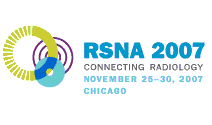
Abstract Archives of the RSNA, 2007
Tai Kobayashi, Presenter: Nothing to Disclose
Samuel Tay Chao MD, Abstract Co-Author: Nothing to Disclose
Alwyn Reuther MPH, Abstract Co-Author: Nothing to Disclose
Gene Barnett MD, Abstract Co-Author: Nothing to Disclose
Michael Vogelbaum MD, Abstract Co-Author: Nothing to Disclose
David Peereboom MD, Abstract Co-Author: Nothing to Disclose
Glen Stevens MD, Abstract Co-Author: Nothing to Disclose
Heinrich Elinzano MD, Abstract Co-Author: Nothing to Disclose
John H. Suh MD, Abstract Co-Author: Speakers Bureau, Schering-Plough Corporation
Advisory Board, Schering-Plough Corporation
Research support, Pharmacyclics, Inc
Research support, Allos Therapeutics, Inc
Scientific Advisory Board, Allos Therapeutics, Inc
To determine whether hypofractionated radiation is beneficial in treating progressions in glioblastoma multiforme.
After review of Cleveland Clinic’s brain tumor database, 10 patients were identified who received hypofractionated radiation (RT). The following data was obtained for each patient: age at RT completion for first recurrence, Karnofsky Performance Status (KPS) at initial diagnosis, total dose and number of fractions at first progression, date of initial therapy, status and dates of first and second local progressions, status of death, and date of death or last follow-up if alive. One patient was lost to follow-up after the initial progression. Median second progresssion-free and overall survival times were calculated using the Kaplan-Meier method.
The median age was 53 years old (range: 34-77), where 30% of our patients were over 60 years old. The KPS at initial diagnosis was >70 in 60% and all patients received RT after their diagnosis. Seven patients had concurrent chemotherapy and 8 had resections.All patients were found to have progressions after initial RT. Only 3 patients had progressions in the region initially treated; the others had enhancements into adjacent areas. Upon progression, patients received a median dose of 2800 cGy (range: 2100-3500 cGy), with a median of 7 fractions (range: 3-7). Additionally, 2 patients had surgery and another 2 underwent chemotherapy.Overall median survival was 8.3 months, which is comparable to previously published data. In patients over 60 years old, the median overall survival in months was 8.3 versus 6.1 for those <60 years old. Patients with a KPS>70 at initial diagnosis had a median survival of 8.3 months versus 6.0 months in patients with a KPS <70. Doses > 2800 cGy tend to only survive a median of 6.0 months, compared to 6.1 months for < 2800 cGy.Fifty percent of the patients in this series progressed after radiation. Five of the patients had a progression in the same area as initially treated. Median progression-free survival was 1.9 months for all patients. Median second progression survival time for age (>60 vs <60 years) and total dose of first progression (>2800 vs <2800 cGy) were 1.9 and 3.4 months for both variables, respectively. Patients with a KPS>70 at initial diagnosis had a median progression-free survival of 1.8 months, versus 1.3 months in patients with a KPS <70.
Hypofractionated radiation may prolong survival by 6 months following progression, but despite radiation, patients continue to recur. Future studies may include the use of biological modifiers, radiosensitizers, or chemotherapy along with hypofractonated radiation.
Kobayashi, T,
Chao, S,
Reuther, A,
Barnett, G,
Vogelbaum, M,
Peereboom, D,
Stevens, G,
Elinzano, H,
Suh, J,
Hypofractionated Radiation Treatment in Recurrent Glioblastoma Multiforme. Radiological Society of North America 2007 Scientific Assembly and Annual Meeting, November 25 - November 30, 2007 ,Chicago IL.
http://archive.rsna.org/2007/6000625.html

